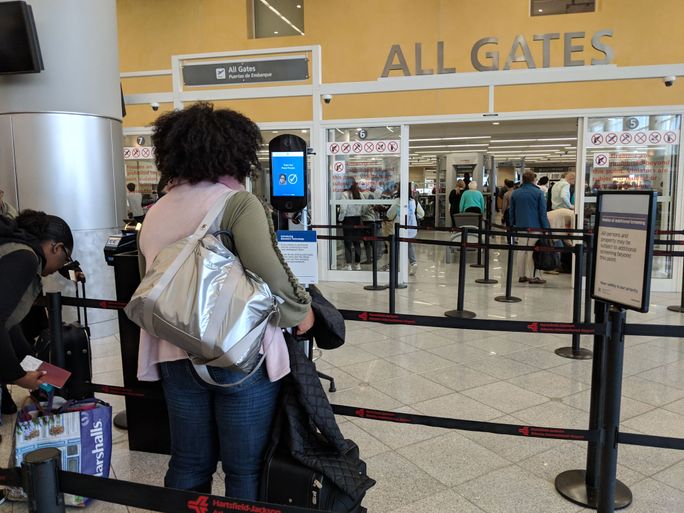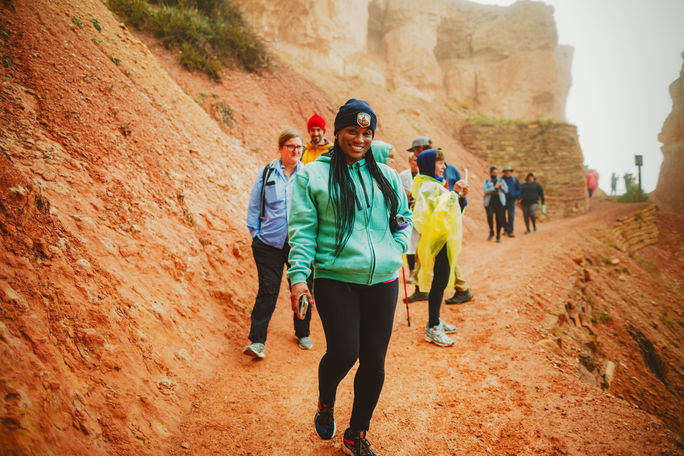Do an Internet search for ��racial profiling travel�� or ��racial profiling in airports�� and thousands of articles will pop up.
There��s the story about two Black comedians who are suing an Atlanta airport for targeting Black travelers and people of color for narcotics searches on jet bridges. One article tells the story of a hotel in Rapid City that turned away a family because the father was Native American and another article is about GloRilla, a Black woman rapper who was accused of stealing her own car by a hotel valet. I also read about a Mesa Airlines pilot who refused to fly a plane with two Arab Muslim individuals on the flight because the pilot equated their ethnicity and religion with terrorism.
Not all racial profiling incidents are shared in official articles. Thousands of anecdotes exist from Latinos who are questioned by officials over their citizenship status on trains, buses, and airports to Middle Eastern and South Asian people being pulled aside for additional security checks and Black travelers being refused Airbnbs.
As a woman of color who has traveled across the world for the last eight years, I��ve experienced racial profiling myself. And I��m not the only one in the industry who has �C just ask Zina Bencheikh, Intrepid Travel��s Managing Director EMEA (Europe, Middle East, and Africa).
��Most of my travels are incident-free. However, as a Moroccan woman who travels regularly to the Middle East for work, I have been taken aside and interviewed at airports on a couple of occasions. It happened when I was traveling during a period of heightened tension, following the terrorist attacks in Madrid in 2004,�� she said.
One of the best definitions of racial profiling comes from the Ontario Human Rights Commission. They describe it as ��any action undertaken for reasons of safety, security or public protection, that relies on stereotypes about race, color, ethnicity, ancestry, religion, or place of origin, or a combination of these, rather than on a reasonable suspicion, to single out an individual for greater scrutiny or different treatment.��
Within the travel industry, racial profiling occurs in all sectors �C airports, on planes, in hospitality (hotels, vacation rentals, etc.), on cruises, buses, trains, tour groups, museums, etc.
Sometimes racial profiling occurs on the part of a representative of a travel company toward a customer. Other times, it happens between travelers, such as when a traveler questions why a person of color would be in the first-class boarding line.
It also presents itself as travelers racially profiling staff of travel companies. For instance, during a trip to Alaska, I overheard a white woman assuming that a Black tour group bus driver had stopped the bus to smoke weed, even though he had just informed us that a warning light had appeared on the dash, and he was getting off the bus to investigate the problem. This was followed by a white male traveler who followed him off the bus and walked straight to a police officer to complain, who then came and questioned our bus driver.?
Founder and CEO of luxury travel agency, Eugene Toriko, Maurice Smith is all too aware of racial profiling in our industry and the diverse ways in which it presents itself.
��Given my personal travels and encounters with tourists and unfortunately some hotel staff, I am aware that racial profiling is a significant issue in the travel industry. In my professional role, I have also encountered clients who have shared their distressing experiences of racial profiling,�� he said.?
In his experience, he��s found that even the possibility of racial profiling affects travelers, especially in their decision of where to travel. For instance, many travelers of color are aware that they could face racism in the American South, especially in places like Florida where the NAACP has issued travel advisories for Black travelers, travelers of color, and/or those within the LGBTQIA+ community.
��We have observed hesitancy among clients, particularly from marginalized communities, in choosing certain destinations or modes of travel. At Eugene Toriko, we address these concerns by providing thorough guidance, offering alternative destinations or experiences, and ensuring our clients feel supported and safe throughout their journey,�� Smith said. ��This is extremely unsettling as one shouldn��t have to make travel decisions based on these factors but that��s the reality that we live in.��
While racial profiling occurs in all levels of travel, Smith points out that ��racial profiling can be prevalent in the luxury travel sector, often stemming from ingrained stereotypes and biases.��
He added, ��Instances like Black and brown travelers being overlooked or questioned in first-class scenarios are unacceptable��it��s happened to me on several occasions. As a luxury travel agency, we actively challenge these biases and work to educate our partners in the industry about the diversity of luxury travelers.��

Facial Recognition at the Airport (photo by Eric Bowman)
But what about systematic racial profiling? Whereas we often think of racial profiling as one person assuming something negative about another person based on their race, we must acknowledge that racial profiling has been built within the systems of the travel industry.
This presents itself in numerous ways. For instance, we know that many TSA body and facial scanners have issues with reading and recognizing the skin tones and hair types of people of color, which then results in more personal searches of these travelers at airports. Airbnb is also contending with this as their AI could not match two images of a South Asian woman who then couldn��t make any bookings.
Systematic racial profiling can be built within the structure of a company itself �C especially when it lacks diversity at all levels, from the board room to the CEO, managers, and customer-facing employees.
��Whether it��s in hiring practices to ensure the workforce itself is diverse and representative of the destination, or proper training for those in customer-facing roles, there are a lot of ways that travel companies can become more inclusive,�� Benchkeih explained. ��In 2022, we launched the first-ever ethical marketing guidelines in the global travel industry. The guidelines were made to create more rigor and public accountability around improving DEI, transparency, ethics and openness across our global marketing. We aim to amplify the voices of Black, Indigenous, and People of Color (BIPOC) across all our marketing channels, to ultimately become a brand that is anti-racist and anti-oppression. As part of these guidelines, we��ve made it our business to take tangible actions towards a more inclusive travel industry.��
As a certified B-Corp, Intrepid Travel is held to rigorous standards of diversity and inclusion, which in turn creates a better environment for Black and brown travelers and employees. While not all travel companies are B-Corp, that does not mean that it is not their responsibility to do their part toward eradicating racial profiling within their working sphere.
Smith suggests a multi-faceted approach: ��This includes rigorous staff training on diversity and unconscious bias, creating and enforcing anti-discrimination policies, and fostering an inclusive environment. Additionally, listening to and amplifying the voices of those who have experienced racial profiling is crucial. Collaboration across the industry to share best practices and learn from each other can also make a significant difference.��
Smith points out that actively removing racial profiling from the spaces that a travel company manages is ��not just a matter of ethical responsibility; it's also good for business.��

Travelers hiking through the US. (photo courtesy of Intrepid Travel)
Destinations and travel, hospitality, tour, and cruise companies should keep this in mind �C as people of color will not spend their money with companies or destinations that do not or will not take active stances on eradicating racial profiling. Losing their patronage can have serious consequences on a business. You only need to look at the numbers to know that Black travelers are a $109.4 billion dollar travel group and U.S. Latinos spend $113.9 billion on domestic travel alone. Other communities of color have equally significant spending power.
What we know from various studies and research is that travelers of color are very mindful about where they travel and why. Many of their travel decisions focus on safety �C whether it��s feeling safe on an airline or feeling safe within a destination. If your travel destination is known for racial profiling �C Black and brown travelers will spend their dollars elsewhere. Furthermore, travelers of color are no longer limited in their choices of how they travel. They will invest their money into transportation options that are safer, treat them with respect, and offer a more inclusive experience.
While the travel industry opened its eyes to the experiences of people of color as consumers and employees of the industry in 2020, there are still far too many articles and anecdotes about racial profiling having occurred since then, and people of color are taking note. As you make business plans for the new year, make it a point to combat racial profiling through concrete steps �C diversifying your employees from top to bottom, diversity training, DEI consultations, technological updates that do not single out people of color, and more.
As Smith reminds us: ��Travel, hospitality, tourism, and airline companies not only can but should play a critical role in eradicating racial profiling. Creating inclusive, welcoming environments attracts a diverse client base and builds loyalty.��
For the latest travel news, updates and deals, subscribe to the daily TravelPulse newsletter.
Topics From This Article to Explore